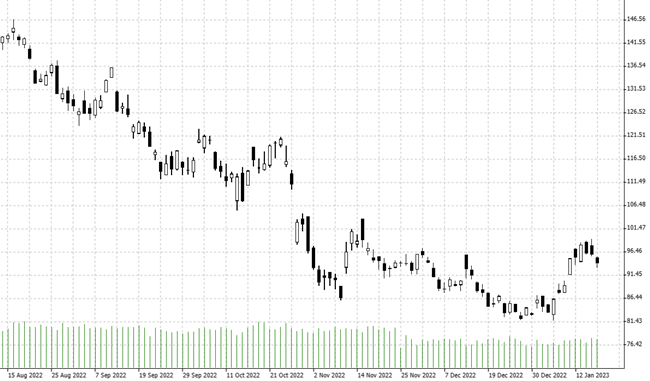

20.01.2023 – Could it be that the shooting stars of recent years are in for a rough ride? On the one hand, the threat of recession and the tightening of the Federal Reserve are taking their toll on the growth stocks. On the other hand, the antitrust authorities are up in arms. And in the House of Representatives, the Republicans now have the power. We take a look at the background.
Let’s take a look at the daily chart of Amazon, pars pro toto. The stock had fallen sharply in recent months. Most recently, hopes of an end to the Fed’s tightening provided support. The Federal Reserve’s current cycle of interest rate hikes is hurting companies because it makes borrowing costs more expensive.

Source: Bernstein Bank GmbH
In addition, the threat of global recession is hitting mega-caps. Already at the beginning of January, Amazon confirmed a wave of layoffs of 18,000 people. Microsoft has just followed suit. Group CEO Satya Nadella announced: “We are making changes today that will lead to 10,000 job cuts (…)”. The company justified the austerity measures with the change in demand. Meta, Twitter and Cisco also reported job cuts.
Nasty antitrust authorities
In addition, the anti-trust authorities have also caused trouble in recent weeks. In December, the competition authority FTC filed a lawsuit to prevent Microsoft from buying the video game producer Activision. The deal is said to cost $70 billion. Since the end of 2021, the FTC has wanted to prevent Facebook parent Meta from buying virtual reality producer Within. We think: If the authorities continue to interfere with the high-tech giants, a renewal of the business in the middle of the recession could fail. Which could have a negative impact on the results.
Unpaid bills
The new balance of power in the House of Representatives also threatens trouble. There are some scores to settle: Silicon Valley traditionally supports the Democrats with millions of dollars – the high-tech giants want open borders so that software geniuses can enter the country as easily as possible. At Microsoft, Google, ex Twitter and co. woke biotopes have formed – soviet republics that tend to suppress the opinion of political opponents, which is anti-democratic and totalitarian.
In the end, we are dealing – in tandem with the mainstream media – with an opinion cartel that has been able to spread unhindered under the protection of the Dems. A fine example of this is the former flagship paper “Washington Post”, which is owned by Amazon boss Jeff Bezos and of course promotes open borders, which a certain logistics company that relies on low-wage workers can make good use of.
The protective hand
An honest clean-up, however, is likely to be prevented by the Department of Justice and also the FBI. Both agencies were staffed with loyalists under the Obama administration, which they see very nicely in the confidential documents found at Joe Biden’s place. With him, none of this is a problem; with Donald Trump, of course, it was – raid! In this respect, we do not see any control or even a break-up of the cartel companies, which could ultimately create synergies by separating bad parts of the company from the good ones. Thus, languishing in the current state would be the worst thing for the mega-caps. At least until the market celebrates the turnaround in interest rates. We are curious to see how things develop and wish you successful trades and investments!
__________________________________________________________________________________________
The content of this publication is for general information purposes only. In this context, it is neither an individual investment recommendation or advice nor an offer to purchase or sell securities or other financial products. The content in question and all the information contained therein do not in any way replace individual investor- or investment-oriented advice. No reliable forecast or indication for the future is possible with respect to any presentation or information on the present or past performance of the relevant underlying assets. All information and data presented in this publication are based on reliable sources. However, Bernstein Bank does not guarantee that the information and data contained in this publication is up-to-date, correct and complete. Securities traded on the financial markets are subject to price fluctuations. A contract for difference (CFD) is also a financial instrument with leverage effect. Against this backdrop, CFD trading involves a high risk up to the point of total loss and may not be suitable for all investors. Therefore, make sure that you have fully understood all the correlating risks. If necessary, ask for independent advice. CFDs are complex instruments and are associated with the high risk of losing money quickly because of the leverage effect. 68% of retail investor accounts lose money trading CFD with this provider. You should consider whether you understand how CFD work and whether you can afford to take the high risk of losing your money.7
